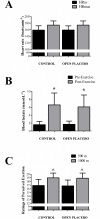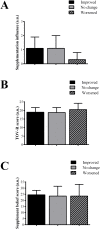"I put it in my head that the supplement would help me": Open-placebo improves exercise performance in female cyclists
- PMID: 31550286
- PMCID: PMC6759201
- DOI: 10.1371/journal.pone.0222982
"I put it in my head that the supplement would help me": Open-placebo improves exercise performance in female cyclists
Abstract
This study investigated the effect of open-placebo on cycling time-trial (TT) performance. Twenty-eight trained female cyclists completed a 1-km cycling TT following a control session or an open-placebo intervention. The intervention consisted of an individual presentation, provided by a medic, in which the concept of open-placebo was explained to the participant, before she ingested two red and white capsules containing flour; 15 min later, they performed the TT. In the control session, the participant sat quietly for 20 min. Heart rate and ratings of perceived exertion (RPE) were monitored throughout exercise, while blood lactate was determined pre- and post-exercise. Post-exercise questionnaires were employed to gain insight into the perceived influence of the supplement on performance. Open-placebo improved time-to-completion (P = 0.039, 103.6±5.0 vs. 104.4±5.1 s, -0.7±1.8 s, -0.7±1.7%) and mean power output (P = 0.01, 244.8±34.7 vs. 239.7±33.2, +5.1±9.5 W) during the TT. Individual data analysis showed that 11 individuals improved, 13 remained unchanged and 4 worsened their performance with open-placebo. Heart rate, RPE and blood lactate were not different between sessions (all P>0.05). Positive expectation did not appear necessary to induce performance improvements, suggesting unconscious processes occurred, although a lack of an improvement appeared to be associated with a lack of belief. Open-placebo improved 1-km cycling TT performance in trained female cyclists. Although the intervention was successful for some individuals, individual variation was high, and some athletes did not respond or even performed worse. Thus, open-placebo interventions should be carefully considered by coaches and practitioners, while further studies are warranted.
Conflict of interest statement
The authors have declared that no competing interests exist.
Figures





Similar articles
-
Effects of branched chain amino acids, l-citrulline, and alpha-glycerylphosphorylcholine supplementation on exercise performance in trained cyclists: a randomized crossover trial.J Int Soc Sports Nutr. 2023 Dec;20(1):2214112. doi: 10.1080/15502783.2023.2214112. J Int Soc Sports Nutr. 2023. PMID: 37229544 Free PMC article. Clinical Trial.
-
Perception of Breakfast Ingestion Enhances High-Intensity Cycling Performance.Int J Sports Physiol Perform. 2018 Apr 1;13(4):504-509. doi: 10.1123/ijspp.2017-0318. Epub 2018 May 14. Int J Sports Physiol Perform. 2018. PMID: 28952831 Clinical Trial.
-
The effect of a caffeinated mouth-rinse on endurance cycling time-trial performance.Int J Sport Nutr Exerc Metab. 2014 Feb;24(1):90-7. doi: 10.1123/ijsnem.2013-0103. Epub 2013 Aug 26. Int J Sport Nutr Exerc Metab. 2014. PMID: 23980239 Clinical Trial.
-
Dispelling the myth that habitual caffeine consumption influences the performance response to acute caffeine supplementation.J Appl Physiol (1985). 2017 Jul 1;123(1):213-220. doi: 10.1152/japplphysiol.00260.2017. Epub 2017 May 11. J Appl Physiol (1985). 2017. PMID: 28495846
-
Caffeine withdrawal and high-intensity endurance cycling performance.J Sports Sci. 2011 Mar;29(5):509-15. doi: 10.1080/02640414.2010.541480. J Sports Sci. 2011. PMID: 21279864 Clinical Trial.
Cited by
-
Boosting open-label placebo effects in acute induced pain in healthy adults (BOLPAP-study): study protocol of a randomized controlled trial.Front Med (Lausanne). 2024 Feb 14;11:1238878. doi: 10.3389/fmed.2024.1238878. eCollection 2024. Front Med (Lausanne). 2024. PMID: 38420356 Free PMC article.
-
Open-label placebos enhance test performance and reduce anxiety in learner drivers: a randomized controlled trial.Sci Rep. 2024 Mar 20;14(1):6684. doi: 10.1038/s41598-024-56600-6. Sci Rep. 2024. PMID: 38509101 Free PMC article. Clinical Trial.
-
Open-label placebo treatment to improve relaxation training effects in healthy psychology students: a randomized controlled trial.Sci Rep. 2021 Jun 22;11(1):13073. doi: 10.1038/s41598-021-92579-0. Sci Rep. 2021. PMID: 34158569 Free PMC article. Clinical Trial.
-
Open-Label Placebo Treatment for Acute Postoperative Pain (OLP-POP Study): Study Protocol of a Randomized Controlled Trial.Front Med (Lausanne). 2021 Nov 5;8:687398. doi: 10.3389/fmed.2021.687398. eCollection 2021. Front Med (Lausanne). 2021. PMID: 34805194 Free PMC article.
-
Placebo and Nocebo Effects on Sports and Exercise Performance: A Systematic Literature Review Update.Nutrients. 2024 Jun 21;16(13):1975. doi: 10.3390/nu16131975. Nutrients. 2024. PMID: 38999724 Free PMC article. Review.
References
-
- Beedie C, Benedetti F, Barbiani D, Camerone E, Cohen E, Coleman D, et al. Consensus statement on placebo effects in sports and exercise: The need for conceptual clarity, methodological rigour, and the elucidation of neurobiological mechanisms. Eur J Sport Sci. In press. 10.1080/17461391.2018.1496144 . - DOI - PubMed
-
- Benedetti F, Pollo A, Colloca L. Opioid-mediated placebo responses boost pain endurance and physical performance: is it doping in sport competitions? The Journal of neuroscience: the official journal of the Society for Neuroscience. 2007;27(44):11934–9. 10.1523/JNEUROSCI.3330-07.2007 . - DOI - PMC - PubMed
Publication types
MeSH terms
Grants and funding
LinkOut - more resources
Full Text Sources
Medical
Research Materials

